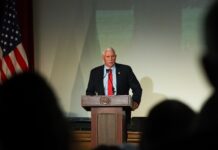Disclaimer: This staff editorial contains mentions of death and suicide and may be triggering to some readers. Please use caution before reading.
To submit a care report for yourself or someone you are concerned about, click here.
If you or someone you know needs help, local help is available through campus police (724-738-3333), the counseling center (724-738-2034) and student support (724-738-2121). Other resources include the National Suicide Prevention Lifeline (1-800-273-TALK) and the Crisis Text Line (text “HOME” to 741741).
The Student Government Association’s Social Justice Committee hosted its first Mental Health Community Café on Tuesday night in the Smith Student Center’s ballroom.
Ken Messina, clinical director of the Student Counseling Center, assisted in facilitating the discussion, answering questions and addressing concerns. He said he was glad to see and hear everyone in attendance because events like the Mental Health Community Café inform him and other counseling center staff members of what changes students would like to see.
One concern in particular was unanimous among almost all attendees at the event: how to continue the conversation and make it more widespread.
“It seemed like at the beginning of last semester, when everyone was first coming to campus, mental health was such a hot topic because of different events happening and programs involving stress management,” one audience member said, “but all of a sudden, when this semester started, it seemed to die down a lot.”
“For some reason, we continuously have these events, we care about it at that time and then it dies,” another participant said. “I want to know what happens to all the people who were continuously talking about it. Please, don’t stop talking about them because mental health is not going to stop being an issue here; it’s just going to fly under the radar until, again, the next big event occurs.”
Another attendee added onto the conversation, saying, “Getting larger groups and organizations on campus involved in these events might help the cause. The groups that tend to bring in the most traffic, somehow partnering with them or even just getting them to post about these events on social media because if people aren’t checking their emails, they are going to check Twitter.”
Participants also discussed the possibility of mental health education or training to students and faculty. One attendee suggested trying to make certain mental health programs mandatory to teach students how to better handle their struggles with mental illness.
“Similar to how various groups on campus have to have hazing training,” another audience member said, “we think there should be mental health management, teaching people how to support others with mental illness. I know we can’t mandate professors, but we could offer it with emphasis on how they’d be supporting their students.”
Another attendee suggested implementing an “Introduction to Mental Health” course for first-year students that discusses how to manage and seek help for their mental health concerns and how to support others around them.
“We think reps from the counseling center could do more education,” another participant said. “I’m sure that they get invited to some FYRST Seminar classes, but that doesn’t necessarily affect anyone who’s not in those seminars or upperclassmen.”
One audience member voiced concerns about the counseling center’s apparent staffing issues, saying that there aren’t enough counselors for the volume of need on campus.
“The health center is maybe understaffed for the number of people and the need at SRU,” one attendee said. “Things like online counseling or video calls, we feel, could be beneficial to the counseling center and a lot of students.”
Another participant stressed the importance of professor’s being aware of and understanding the possible states of their students’ mental health, saying, “There’s a lot expected of us, and we all have a lot going on. We don’t always have the time to really take care of ourselves, eat right, take time for ourselves or actually take a break.”
Other specific mental health concerns and topics were brought to Messina, including alcohol and drug abuse. An attendee shared her personal story with the audience, saying that it needs to be more directly addressed in order to help those who are struggling with substance misuse and abuse.
“It’s something that’s so taboo because a lot of us are underage,” she said, “but the reality is, every weekend or sometimes even during the week, we go out and binge-drink or get high. We’re told these things are wrong, but they happen every day.
“Last year, during my first semester on campus, my friend killed himself,” she continued. “He was abusing alcohol, and I think that was a big reason why he couldn’t gauge his emotions. That’s something we need to talk about.”
Another attendee shared his personal struggles with seeking counseling as a transgender person, saying that it’s been difficult to find a counselor who has specific knowledge and understanding of his experiences.
“I always run into these barriers where I reference something pertaining to being trans and gay,” he said. “It’s very hard to work through something that directly correlates to your experience with someone who doesn’t have any frame of reference for what that’s like, and having to educate your therapist is really challenging.
“I’m trying to work through my own garbage, and when they don’t understand something, it’s kind of frustrating for both parties,” he continued. “I feel like it would be a good idea to maybe host some kind of ‘queer crash course’ with all of the counseling staff so they can be better prepared to deal with that if they themselves are not queer.”
During the discussion, one audience member commended Messina for actively being part of the university community, attending events and engaging with students.
“I give you a lot of credit and thank you for being here,” she said. “Before you, I didn’t even know who the director of the counseling center was because I never saw him at any events. We see how hard you’re working.”
Messina assured everyone in the audience that the counseling center is working to bring a lot of ideas and plans to life. He announced that a men’s mental health group will begin meeting soon. He said the purpose of the group is to “help men on campus learn more about their mental health and emotions and how to express their emotions in a healthy way.”
He also announced the upcoming “Get Ahead of Stress” event that will take place Feb. 6 at 5 p.m. in room 322 of the Smith Student Center. Anyone is welcome to attend, he said, and discuss stress management, learn helpful stress management tips and figure out effective ways to get ahead of your stress before midterms approach.









